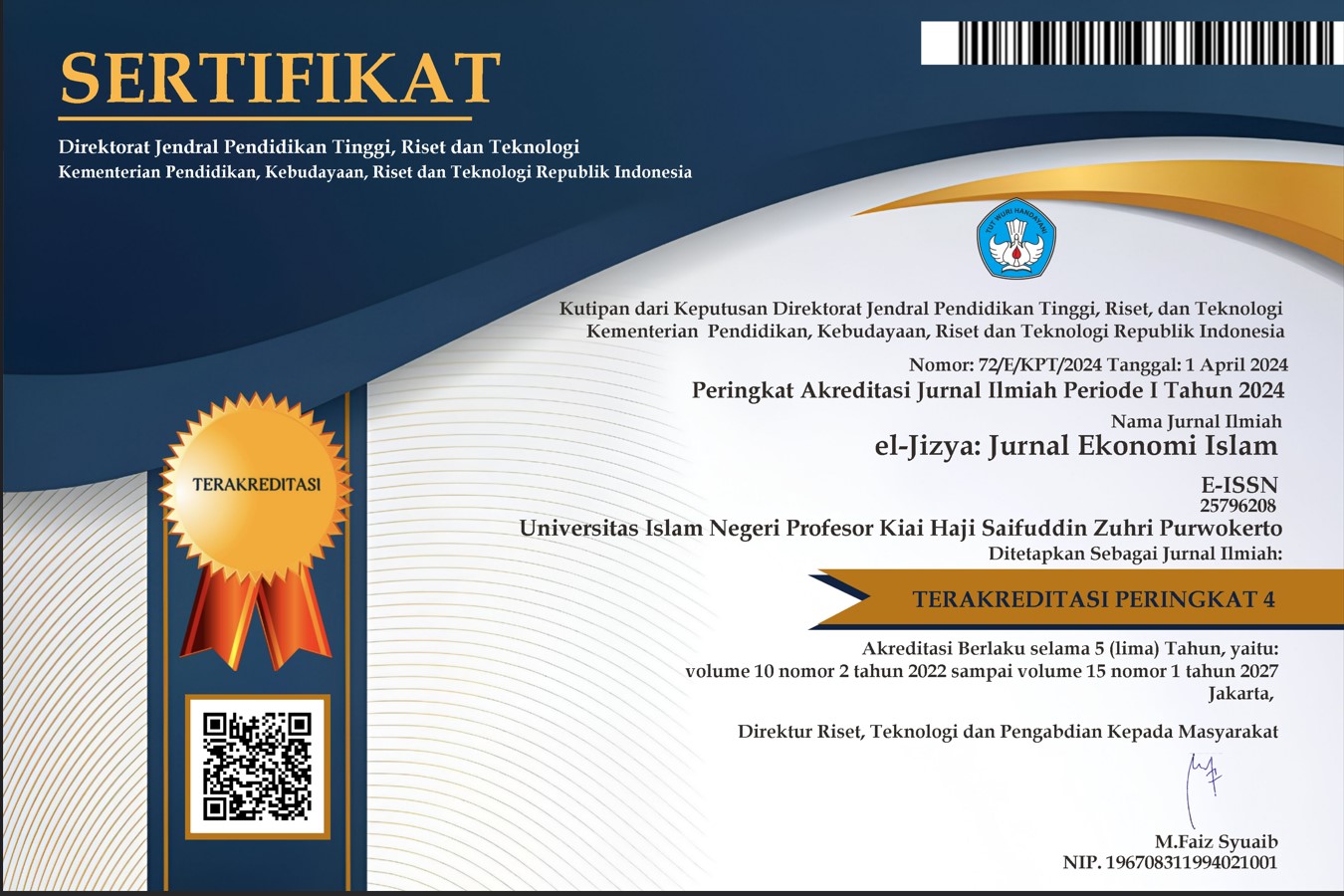Zakat Sebagai Pilar Utama Pemaknaan Keadilan Sosial
DOI:
https://doi.org/10.24090/ej.v12i2.10558Keywords:
zakat, social justiceAbstract
This article raises the theme of Zakat as the Main Pillar of Meaning of Social Justice using descriptive qualitative research methods. This research describes the concept of zakat in Islam, social justice in Islam, and the role of zakat as a tool for interpreting social justice. Research findings show that social justice is the main foundation in various legal and economic systems in many countries. The principle of zakat in Islam appears as a key element to achieve this goal. Zakat, as an obligation of Muslims, is not only a social charity, but is also integral to the Islamic economic system to create a fairer distribution of wealth. The importance of zakat is not limited to Muslim communities, but has universal relevance. Concepts such as social solidarity and collective responsibility for the common welfare that underlie zakat can be an inspiration for achieving social justice in various communities and nations. Involving the community in the principles of zakat is expected to create an environment where wealth and resources are distributed more evenly, giving all individuals better access to reach their full potential. Thus, zakat is not only a religious obligation, but also an important instrument for achieving common goals in realizing social justice throughout the world.References
Agustami, E. (2019). Keadilan Dalam Perpekstif Al-Qur’an. Jurnal Taushiah FAI-UISU, 9(2), 8–13.
Ahmad Warson Munawir. (1997). Kamus Al Munawir Arab-Indonesia Terlengkap. Pustaka Progresif.
Akbar, W., & Tarantang, J. (2018). Manajemen Zakat (Hakikat dan Spirit Alquran Surah At-Taubah [9]: 103) (A. Dakhoir, Ed.). K-Media.
Alim, H. N. (2023). Analisis Makna Zakat Dalam Al-Quran: Kajian Teks Dan Konteks. Jurnal Mahasiswa Humanis, 3(3).
Amaroh, S. (2014). Prinsip Keadilan Sosial Dan Altruisme Dalam Penerapan Sistem Perbankan Syariah. Economica: Jurnal Ekonomi Islam, V(2), 87–105.
Depdiknas. (2002). Kamus Besar Bahasa Indonesia. Balai Pustaka.
Garaudy, R. (1986). Mencari Agama pada Abad XX: Wasiat Filsafat Roger Garaudy, [terj.] H.M. Rasyidi. Bulan Bintang.
Hafidhuddin, D. (1998). Panduan Praktis Tentang Zakat, Infak, dan Sedekah. Gema Insani.
Kusuma, K. A. (2016). Mengembangkan Indikator Ekonomi Islam Melalui Zakat: Sebuah Kerangka Untuk Mengukur Kesejahteraan Masyarakat/Negara Muslim.
Maufur, S., & Iswandi, I. (2022). Pengaruh Pemanfaatan Dana Zakat Produktif Terhadap Tingkat Pendapatan Mustahik (Studi Kasus pada Badan Amil Zakat Nasional di Kecamatan Haurgeulis, Kabupaten Indramayu) (Vol. 1, Issue 4). http://melatijournal.com/index.php/Metta
Nafiah, L. (2015). Pengaruh Pendayagunaan Zakat Produktif Terhadap Kesejahteraan Mustahiq Pada Program Ternak Bergulir Baznas Kabupaten Gresik. El-Qist: Journal of Islamic Economics and Business (JIEB), 5(1), 929–942.
Nur, M., & Al Arif, R. (2013). Optimalisasi Peran Zakat Dalam Memberdayakan Perekonomian Umat. In Ulul Albab (Vol. 14, Issue 1).
Roro Fatikhin. (2017). Keadilan Sosial Dalam Perspektif Al-Qur’an Dan Pancasila (Vol. 1, Issue 2).
Rosadi, A. (2019). Zakat dan Wakaf Konsepsi, Regulasi, dan Implementasi. Simbiosa Rekatama Media.
Rosi Nugrahani, I., & Angkita Mulyawisdawati, R. (2019). Peran Zakat Produktif dalam Pemberdayaan Ekonomi Mustahiq (Studi Kasus Lembaga Amil Zakat Dompet Dhuafa Republika Yogyakarta 2017).
Sulaiman, R. (2021). Zakat Dan Keadilan Sosial: Optimalisasi Pengelolaan Zakat Profesi Untuk Pemberdayaan Umat. Asy Syar’iyyah: Jurnal Ilmu Syari’ah Dan Perbankan Islam, 6(2), 125–144.
Zainuddin. (2018). Analisis Yuridis Pemenuhan Hak Sosial Ekonomi Masyarakat Miskin Melalui Zakat Dalam Perspektif Keadilan. Arena Hukum, 11(3), 558–570. https://doi.org/10.21776/ub.arenahukum.2018.01003.8
Downloads
Published
How to Cite
Issue
Section
License
Copyright (c) 2024 Imam Baihaqi

This work is licensed under a Creative Commons Attribution-ShareAlike 4.0 International License.
Authors who publish with this journal agree to the following terms:
- Authors retain copyright and grant the journal right of first publication with the work simultaneously licensed under a Creative Commons Attribution-ShareAlike License that allows others to share the work with an acknowledgement of the work's authorship and initial publication in this journal.
- Authors are able to enter into separate, additional contractual arrangements for the non-exclusive distribution of the journal's published version of the work (e.g., post it to an institutional repository or publish it in a book), with an acknowledgement of its initial publication in this journal.
- Authors are permitted and encouraged to post their work online (e.g., in institutional repositories or on their website) prior to and during the submission process, as it can lead to productive exchanges, as well as earlier and greater citation of published work (See The Effect of Open Access).















